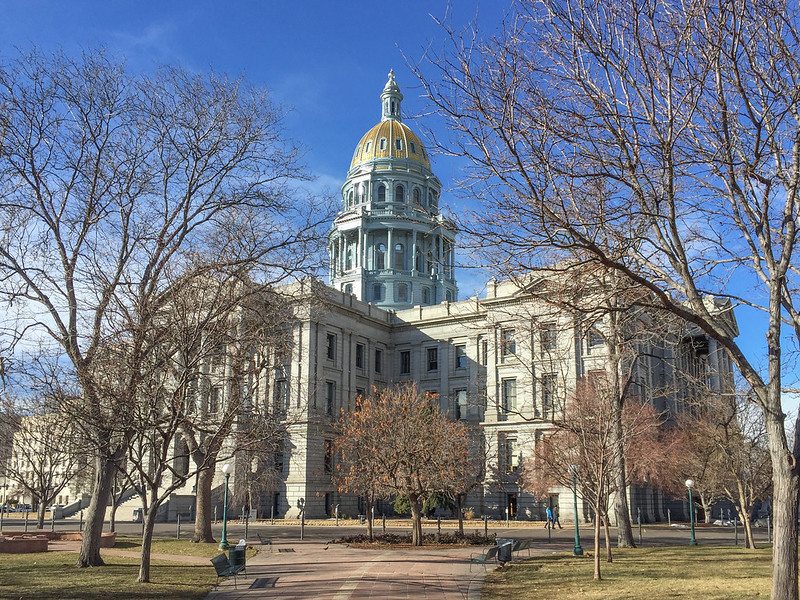
Colorado Democrats have proposed a series of transportation “fees” that will circumvent two taxpayer safeguards in order to avoid asking voter consent at the ballot box. If implemented, these tax hikes will take a whopping $4 billion away from Coloradans over the next decade.
Senate Bill 21-260, which was approved by the Colorado senate yesterday in a near party line vote, would impose a number of new “fees” for transportation. Very little of the money generated from these “fees,” which are, in fact, taxes, would actually go towards roads or bridges.
“[T]he Colorado transportation bill imposes $3.8 billion in new government fees to fund transportation infrastructure priorities—mostly electric vehicles, electric vehicle infrastructure, and multimodal transportation,” explained Ben Murrey, Director of Fiscal Policy for the Independence Institute.
Adding insult to injury, SB 21-260 was intentionally written to sidestep two important taxpayer safeguards: Colorado’s Taxpayer’s Bill of Rights (TABOR) and Proposition 117.
Colorado’s Taxpayer’s Bill of Rights (TABOR) requires voter approval for all new or higher taxes to become law. Unfortunately, over the years, money hungry politicians have found a way around this by simply calling taxes “fees.”
Tired of “fees,” Colorado voters approved Prop. 117 last November, which now requires voter approval for any new enterprise that would derive more than $100 million from “fees” over its first five years. It seems Democrats have already found a way around this new law as well. They intentionally direct the new “fees” that would be imposed under SB 21-260 into different enterprises so they do not meet Prop. 117’s threshold on an individual basis.
SB 21-260 circumvents both TABOR and Prop. 117. In a letter to the Colorado House of Representatives, Grover Norquist, president of Americans for Tax Reform, urged lawmakers to oppose this blatant attempt to raise taxes without voter consent.
“Colorado does not lack revenue for roads. The issue is hard-earned tax dollars are wasted on things such as trains, bike paths, and other pet projects,” wrote Norquist. “Rather than looking for more ways to separate your constituents from their hard-earned money, lawmakers should instead focus on using existing revenues more responsibly.”
To read the full letter, click here.
May 18, 2021
To: Members of the Colorado House of Representatives
From: Americans for Tax Reform
RE: Oppose SB 21-260, a transparent attempt to raise taxes that will not fool anyone
Dear Representative,
On behalf of Americans for Tax Reform (ATR) and our supporters across Colorado, I urge you to oppose any and all efforts to raise taxes, including Senate Bill 21-260, which would impose a number of new transportation “fees” over the next decade. If implemented, these tax hikes, which were intentionally crafted to circumvent important taxpayer safeguards, would inflict a great deal of harm on individual taxpayers, families, and businesses across the Centennial State.
Colorado’s Taxpayer’s Bill of Rights (TABOR) is designed to protect the hardworking people of Colorado from money hungry politicians by requiring voter approval in order for any new or higher taxes to become law. Unfortunately, there is a pretty significant loophole: voter approval is not required for taxes that are called “fees.”
Tired of “fees,” last November, Coloradans approved Proposition 117, the Require Voter Approval of Certain New Enterprises Exempt from TABOR Initiative. Thanks to this new law, voter approval is now required for any new enterprise that would derive more than $100 million from “fees” over its first five years. Clearly, Coloradans want to keep their hard-earned money, but some lawmakers are still refusing to take the hint and are already trying to weaken Prop. 117.
SB 21-260 would impose a series of new transportation “fees” that will take a whopping $4 billion dollars out of the pockets of Colorado taxpayers over the next decade. Together, these fees would generate more than $100 million over five years and would seemingly require voter approval under Prop. 117. But that probably won’t be the case. To avoid going to the ballot, the “fees” are intentionally directed into multiple different enterprises, so they do not meet Prop. 117’s threshold on an individual basis. SB 21-260 proponents came up with this arrangement because they know these tax hikes will not be popular.
One of the most insulting parts of SB 21-260 is the gas “fee.” On its own, the gas “fee” would clearly generate more than $100 million over five years, roughly $152 million in just two years according to the bill’s own fiscal analysis. However, because it is directed into the Highway Users Tax Fund instead of an enterprise, it is unlikely Prop. 117 would be enforced, and because it is called a “fee” instead of a tax, apparently TABOR will not apply either.
Colorado does not lack revenue for roads. The issue is hard-earned tax dollars are wasted on things such as trains, bike paths, and other pet projects. In 2009, the legislature removed the requirement that 10% of transportation revenue must go towards roads and it has never been reinstated. Buttressing this point, a policy brief by the Reason Foundation, How Much Gas Tax Money States Divert Away From Roads, finds “Colorado shares gas tax revenue with local jurisdictions and allows cities and counties to spend up to 15% of their share on transit and 5% on administration.”
Rather than looking for more ways to separate your constituents from their hard-earned money, lawmakers should instead focus on using existing revenues more responsibly. ATR opposes SB 21-260 and urges lawmakers to vote NO!
Sincerely,
Grover Norquist
President
Americans for Tax Reform

